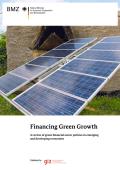In order to achieve a 50 percent reduction in carbon dioxide emissions by 2050, total financing to 2050 of around EUR 30 trillion will be required. The United Nations Framework Convention on Climate Change has concluded that a significant majority of this investment will need to come from the private sector. Public Finance Instruments for low-carbon development are publicly backed interventions that help to close financing gaps, overcome market barriers, and accelerate market uptake of low-carbon measures. This report has been prepared by Frankfurt School of Finance and Management in partnership with the Basel Agency for Sustainable Energy, drawing on the best up-to-date research and experience in the field.
In recent years, China has grown into a major provider of coal power finance in overseas markets, replacing financing by major development institutions. In September 2015, China made a surprise announcement that it would commit to “controlling public investment flowing” into high carbon overseas projects. This was followed by an announcement in November 2015 that OECD countries are committing to common standards for coal subsidies, also potentially significantly restricting international finance for coal power. However, information on overseas coal finance, particularly Chinese finance, has been lacking. CPI has been able to identify China’s role in international coal power generation deployment to provide the most complete estimate of Chinese finance for overseas coal projects to date as well as estimates of the potential impact of China’s recent announcement.

This study highlights the role of the entire financial system in the transition to a green economy and reviews green financial sector policies in emerging and developing economies. It focuses on the political and legal framework conditions, which are essential for a successful financing for green growth. On the basis of ten case studies in emerging and developing countries, the study investigates which strategies, policies and specific policy instruments have been applied at the national level, and how these have directly or indirectly influenced the actions of organisations operating in the financial sector. The study also aims to provide an analytical framework for key stakeholders (governments, donor institutions and the private sector), providing guidance before initiating and building a conducive framework for financing green growth.
This working paper provides a first overview of Central Kalimantan’s oil palm value chain and the business actors involved throughout. It aims to identify how business investment can be optimized to support socially inclusive development, delivering productivity, profitability, and sustainability gains.
Few studies examine how technical assistance helps mobilize additional public and private climate finance to help developing countries mitigate and adapt to climate change. This paper aims to provide some first insights on the topic by analyzing five technical assistance programs of the German ‘Gesellschaft fuer Internationale Zusammenarbeit (GIZ), one of the largest technical assistance agencies worldwide.
